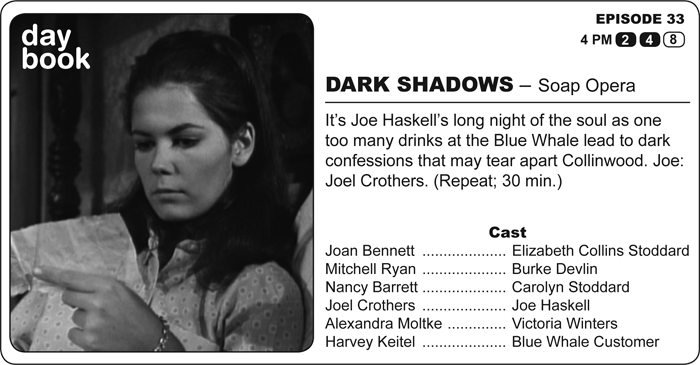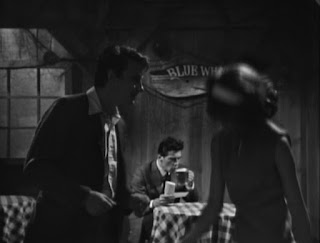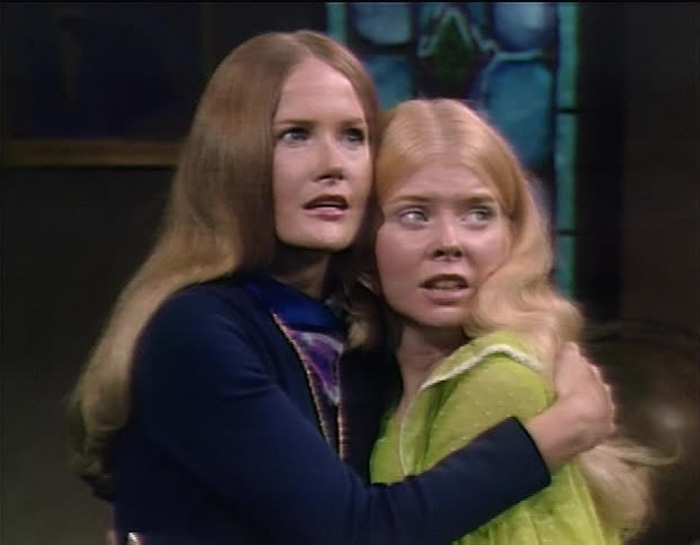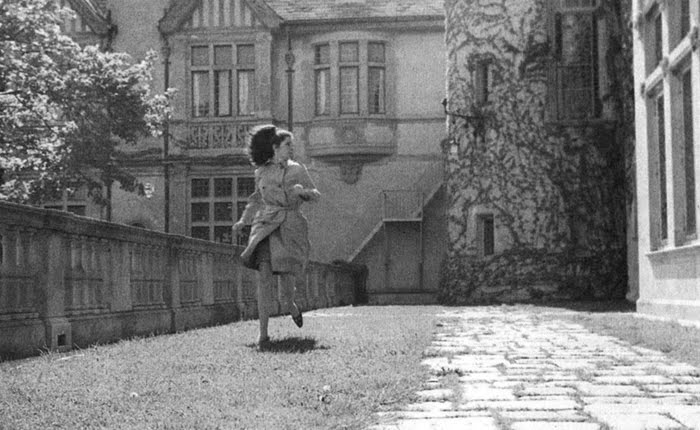
Episode 1, Taped on June 11 & 13, 1966
When Victoria Winters abandons life in New York for a small fishing village in Maine, she finds the beginning and the end of the world. Victoria Winters: Alexandra Moltke. (Repeat. 30 min.)
Quick, operating definitions… “story” is the overall tale, including backstory and exposition. “Plot” is the sequence of events seen by the audience in a given presentation.
Since most viewers begin the show around episode 212, with the release of Jonathan Frid’s Barnabas into 1967, the idea of “first episode of Dark Shadows” is more academic than it might seem. Technically, “1” is indeed the first. However, while it may be where the plot begins, the story of the series has been going on for at least 18 years, with the relevant modern action beginning with the murder of Paul Stoddard. But is even that the first major event? Not quite. The story of this series begins in 1946 with the birth of Victoria Winters, whose abandonment creates the first, true, chronologically-correct mystery to contemplate. But neither of those storylines amounts to a hill of bones for the majority of audiences, since the series has moved on by the time Barnabas appears. And yet, the have value, both literally and metaphorically.
Thanks to syndication and the salad bar nature of audience-selected watching, the series begins wherever we, as individuals, want it to. Many who began in the Leviathan era simply continued back at the “beginning,” whether with 1 or 212, and as far as they are concerned, it keeps going after 1245 with episode 1. This makes Dark Shadows unique among serialized television because it’s a Moebius strip. Begin where you want. Stop where you want. The plots always fit into a larger story, and one that I hope will never be fully told.
In this sense, 1245 and 1 exist both at opposite ends of the series and as neighbors. They are bookends, yes, and they occupy the same space. Watching them together draws the series into one of the few perspectives not usually thought of, and while the plot may not be contiguous, the theme is. Important to qualify that because, yes, technically, one takes place in a parallel universe. But when the difference is 131 years anyway, I’m not sure that’s germaine. Last week often feels like a parallel universe. Primary Time or Parallel, it’s still Dark Shadows, and looking at the two literally defines the parameters of what that means.
In episode 1, a highly isolated Liz squabbles with an unusually repressed Roger over the impending arrival of a new governess. Said governess, Victoria, arrives on an evening train amidst a flashback. In it (and another), we learn that the mature orphan was hired by Elizabeth, a woman she’s never met. With no key to her past and no real path to the future, Victoria sees this as her way both out of and in to her destiny. Brooding businessman, Burke Devlin, reluctantly ushers her into the inn where both he and waitress Maggie Evans are unsuccessful in dissuading the strangely, forlornly plucky Victoria into abandoning the new job. She arrives and is greeted by Liz as the credits roll.
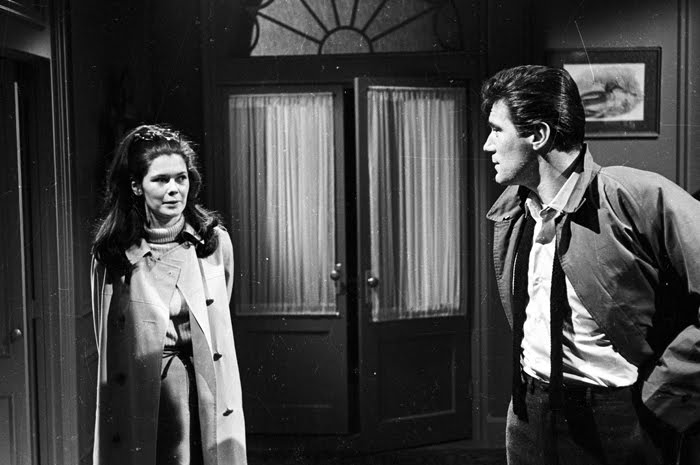
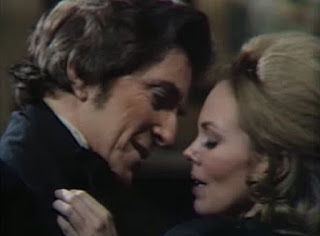 In episode 1245, Bramwell and Catherine survive their night in the haunted lottery room, but not before Catherine stops the ghost of Brutus from choking Bramwell, which she does by refusing to join the specter in, yes, a bizarre act of unnatural love. Morgan awaits outside, and as dawn breaks, he shoots Bramwell and carries Catherine onto the roof. There, Kendrick tussles with Morgan until the madman falls to his death. A wounded Bramwell comforts Catherine. Across the estate, a revived Melanie is rejoined with Kendrick, and the two couples celebrate having survived the last curse (of many) at Collinwood.
In episode 1245, Bramwell and Catherine survive their night in the haunted lottery room, but not before Catherine stops the ghost of Brutus from choking Bramwell, which she does by refusing to join the specter in, yes, a bizarre act of unnatural love. Morgan awaits outside, and as dawn breaks, he shoots Bramwell and carries Catherine onto the roof. There, Kendrick tussles with Morgan until the madman falls to his death. A wounded Bramwell comforts Catherine. Across the estate, a revived Melanie is rejoined with Kendrick, and the two couples celebrate having survived the last curse (of many) at Collinwood.The differences are obvious. Both take place in vastly different time periods, literally, and by 1245, the Bryl Cream, beehives, and black & white are distant memories. Both are intense, but one is a Pirandelloesque study in existential angst and the other is a truly Gothic ghost story where love defeats the anguish of the past. Episode 1 begins just past sunset, and episode 1245 arrives with the rise of the sun.
Still, this blend of storytelling chalk and cheese both involve the same message: Collinwood (and whatever it represents) has no future unless it opens its doors. Both Collinwoods (1841 PT and 1966) are dying. Both Collinwoods are cages to trap the sins of yesterday… and their witnesses. Both Collinwoods find the eventual path to the future by embracing newcomers. Both Catherine and Victoria are of Collinwood and apart from it, and both are outsiders whose brave examples reveal the home as a place for the living more than the dead. Each is haunted (in one form or another) by the ghosts of husbands (Brutus and Paul) whose marriages gave way to disaster. By opening their fortress of aristocracy to strangers, despite its secrets (or perhaps because of them), the Collinses save themselves after decades of standing apart. They illustrate and outmaneuver the definition of insanity by, at last, trying something different.
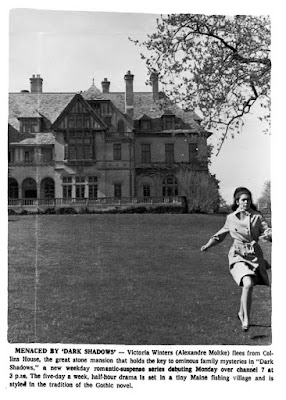 June 27 falls at the end of Pride Month and one day before the anniversary of the Stonewall uprising. Concomitantly, Dark Shadows is cited as a place where outsiders find a haven. Which it is, but not necessarily on the surface. When looked at character-by-character, most of the outsiders are seeking a “cure” to be “normal,” a disastrous assertion. This makes the show’s sense of inclusiveness seem inarguably problematic. And yet, it’s still a tribute to inclusiveness down to its storytelling DNA.
June 27 falls at the end of Pride Month and one day before the anniversary of the Stonewall uprising. Concomitantly, Dark Shadows is cited as a place where outsiders find a haven. Which it is, but not necessarily on the surface. When looked at character-by-character, most of the outsiders are seeking a “cure” to be “normal,” a disastrous assertion. This makes the show’s sense of inclusiveness seem inarguably problematic. And yet, it’s still a tribute to inclusiveness down to its storytelling DNA.To the outside world, Collinwood, itself, is self-alienated from any kind of healthy, normal home. It is obsessed with guilt over crimes that were all ultimately explainable. Crimes with context. Crimes that, in some ways, were not crimes. Brutus was not justified in his wrath, and perhaps Liz was. In the light of Paul’s subsequent and cruel manipulation-by-silence, he is clearly worthy of disdain. Maybe not a fireplace poker’s worth, but disdain, nonetheless. If this were a true crime, Liz would not have been forgiven by the series. But she is. Her journey begins here, by letting in someone new. And that fact that Vicki is never revealed as her daughter makes that governess an outsider as much as Catherine Harridge. Outsiders who change that small world by asking the right questions when they don’t understand and taking decisive action against tradition when they do and when others simply accept the status quo.
Yes, microcosmically, Dark Shadows may seem to be about outsiders pursuing cures so that they may be welcomed inside. Reconsidered from a larger vantage, Dark Shadows actually reverses this. It shows an establishment saving itself by opening its doors to those who thrive outside them.
Yes, the beginning and the end of the world -- that refuses to end.
This episode hit the airwaves June 27, 1966.

